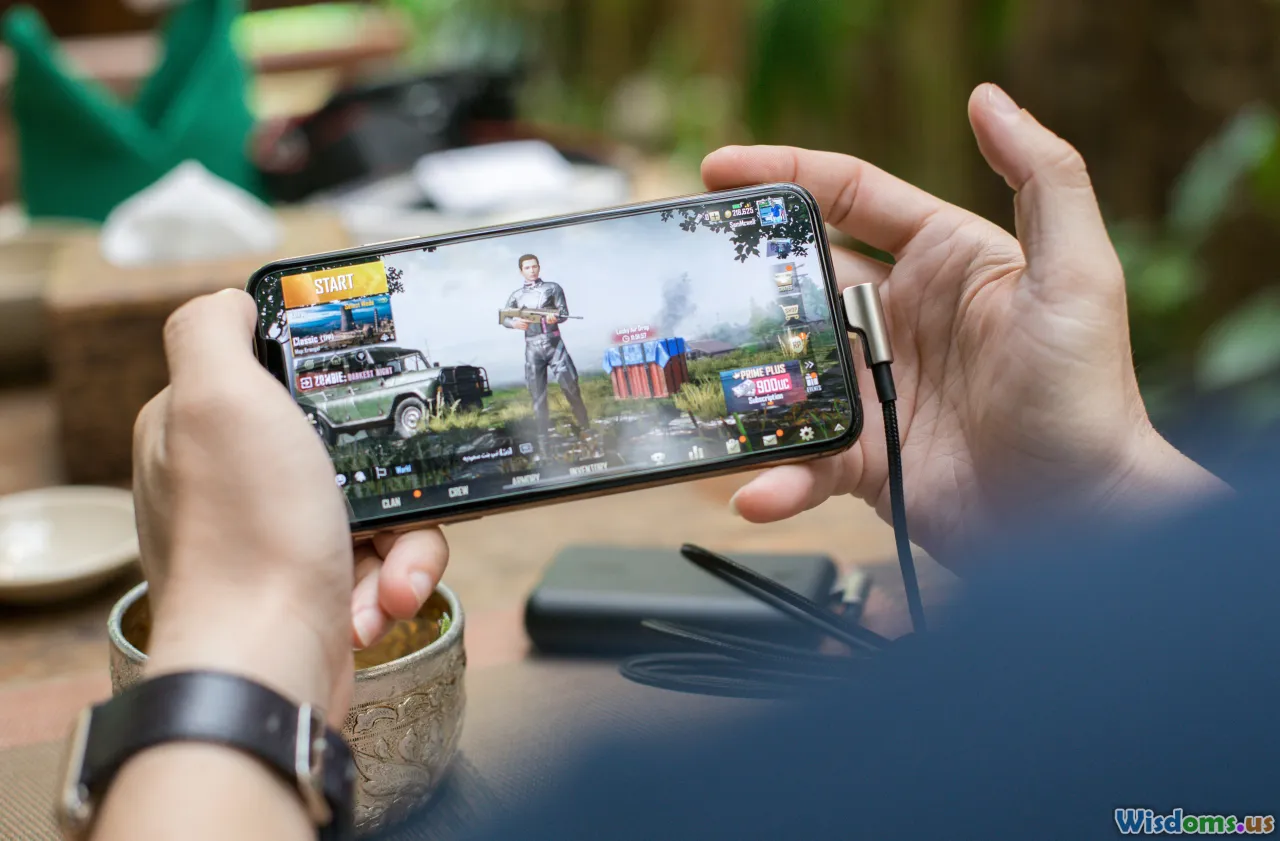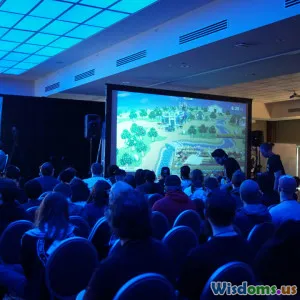
Mobile Strategy Games Outshining PC Rivals in 2024
15 min read Explore how mobile strategy games are outperforming PC counterparts in 2024 with innovation, accessibility, and engaging features. (0 Reviews)
Mobile Strategy Games Outshining PC Rivals in 2024
Modern gaming has entered an era where the boundaries between platforms blur with each new innovation. Once relegated to the casual fringes, mobile strategy games in 2024 have not only caught up to their PC rivals but, in some areas, surged ahead. Whether through cutting-edge mechanics, social integration, or global accessibility, this genre's meteoric rise on mobile is a story few could have predicted. Let's explore how and why mobile strategy games are outshining their PC competitors this year.
The Evolution of Mobile Strategy Gaming

The journey from basic, turn-based titles like Plants vs. Zombies to full-scale empire-building behemoths such as Rise of Kingdoms or State of Survival is nothing short of remarkable. Early mobile strategy games prioritized simplicity because of hardware and input limitations. Yet over time, smartphone technology caught up—2024’s flagships rival gaming laptops in processing power and vibrant displays.
Pushing the Envelope
Developers have seized these advancements to introduce complex systems once found only on PC. Clash Royale’s real-time tactics, Mobile Legends: Adventure's resource management, and Total War Battles: Warhammer with its deep faction mechanics showcase just how nuanced and challenging mobile titles can be.
Example: Total War Battles: Warhammer
The adaptation of the iconic PC strategy franchise to mobile was met with skepticism. In 2024, though, it boasts:
- 50+ detailed armies,
- asynchronous multiplayer sieges,
- and a mod-friendly engine, thanks to community toolkits.
Today, Total War Battles: Warhammer commands millions of daily active users worldwide.
Accessibility and Ubiquity Drive Growth

One of the most powerful advantages of mobile strategy games is their universal accessibility. Nearly everyone has a smartphone, making mobile strategy titles more egalitarian and approachable than their PC counterparts.
Cross-Platform Accessibility
The best titles of 2024, including Marvel Snap and Legends of Runeterra, integrate cross-platform progression and multiplayer. Players can outmaneuver friends or strangers across phones, tablets, and even PCs, with matches lasting anywhere from three minutes to an hour. This means enjoying a strategic tussle on a commute, a lunch break, or lounging at home—something the cumbersome PC setup cannot match.
Example: Marvel Snap's "Play Anywhere"
Marvel Snap demonstrates seamless experience. In the morning, craft a deck on a laptop; at lunch, play a quick match on your phone; review tournament stats on your tablet at day’s end—without losing progress.
Swift, Satisfying Competitive Play

Competitive play thrives in the mobile strategy scene. 2024 has seen mobile eSports events surpassing PC ones in audience figures, prize pools, and Twitch viewership.
Esports Surpassing Expectations
- Clash Royale League World Finals 2024: Over 12 million concurrent viewers and a $3 million prize pool—PC strategy eSports rarely see such numbers.
- Rise of Kingdoms Championship: Regional and global tournaments drew attention for their dramatic live broadcasts and engaging formats tailored for engrossing short sessions.
These games facilitate rapid matchmaking, low-latency connections, and worldwide rankings, making competitive strategy accessible to both casual and aspiring pro gamers.
Fast Session Design
Mobile games are often engineered for shorter, more intense bursts, rarely exceeding 10 minutes per match in many leading strategy titles. This rapid tempo results in:
- Less downtime and quicker learning loops.
- Greater retention and daily engagement.
- Opportunities for micro-tournaments and on-the-go competitions.
Innovative Monetization & Community-First Design

A major criticism of early mobile gaming was the prevalence of predatory free-to-play models. In 2024, leading developers shifted toward player-centered monetization strategies, borrowing favorable elements from PC and perfecting them for mobile ecosystems.
Fair Monetization Models
Popular mobile strategy titles like Teamfight Tactics offer:
- Cosmetic-Only Purchases: Players pay for visual flair, not gameplay advantages.
- Battle Passes: Encouraging active engagement by rewarding both time and money investments efficiently.
- Generous Free Rewards: Daily login bonuses and skill-based unlocks.
As a result, the pay-to-win stigma is rapidly fading on mobile, with most high-grossing games maintaining vast free-player communities.
Real Example: Honkai: Star Rail's Community Model
Although not strictly a strategy game, Honkai: Star Rail’s reward system and transparent monetization have inspired others in this space, promoting goodwill and sustained player interest.
Social Features Drive Deep Engagement

No longer are strategy games solitary affairs. Mobile titles harness the always-connected nature of smartphones for deeper, more meaningful social integration than many PC games.
Alliance Creation and Real-Time Communication
Games such as State of Survival and King of Avalon thrive on alliances:
- Players form persistent in-game groups.
- Messaging, voice chat, and coordinated events occur in real-time.
- Strategies are crafted on the fly, with mobile notifications improving response times.
This dynamic fosters tightly-knit communities able to coordinate complex strategies—something not always easy on a PC, where players may be less likely to keep a window open or respond instantly.
Cross-Border Play
Mobile games often prioritize multi-language support, auto-translation chat features, and easy friend-invite options via social platforms. Whether you’re in New York, Seoul, or São Paulo, playing alongside international friends is frictionless.
Touchscreen and Adaptive Controls Enhance Playability

Touchscreens, once seen as inferior to mouse-and-keyboard setups, have flourished with innovations in adaptive controls. 2024’s mobile strategy games leverage gesture-based commands, pinch-zoom interfaces, and haptic feedback to expedite input and improve tactical decision-making.
Designed for Fingers
Clash of Clans and Auto Chess Mobile demonstrate how tailored interfaces can make even the most complex maneuvers intuitive. Some prayer features:
- Drag-and-drop unit deployment.
- Real-time path adjustments via swipes.
- Adaptive UI elements that minimize clutter during tight moments.
Example: Touch-Based Micro-Management
PUBG Mobile: Tactical Mode expands on traditional shooter micro-tasks—rapidly assigning move/defend/harass commands to squads, all via swipes and context-sensitive pop-ups, with a responsiveness that matches or exceeds PC hotkeys.
Artificial Intelligence and Live Events Transform Gameplay

AI-driven design has reached new heights. Today's mobile strategy games utilize machine learning and procedural generation to deliver:
- More responsive AI opponents who learn your favorite builds.
- Dynamic live events that reflect player behavior in real time.
Smarter Enemies and Specific Challenges
2024’s Star Trek Fleet Command uses evolving AI admirals, adjusting ship fleets and tactics after observing your historical play patterns, preventing stale or repetitive gameplay.
Live Operations and Seasonal Content
Mobile live event schedules have become more ambitious than those on PC. Developers:
- Roll out weekly or even daily PvP tournaments tied to in-world story changes.
- Offer season passes brimming with unlockables linked to real-time world progression.
Hardware, Cloud Gaming, and 5G Elevate the Experience

Smartphones in 2024 outclass many entry-level laptops. Snapdragon 8 Gen 4 chips, vapor-chamber cooling, and 144Hz OLED displays can now handle multitasking and heavy graphical loads effortlessly.
The Cloud's Strategic Edge
Thanks to 5G and advanced mobile data plans, cloud-powered strategy games like XCOM Tactics Cloud Edition run on remote servers, streaming console-quality visuals with zero perceptible lag. This levels the playing field—players with modest devices access uncompromised strategy content.
Real-World Example: Age of Empires Mobile Cloud
By leveraging Microsoft’s Azure Cloud, Age of Empires Mobile Cloud lets entire guilds conduct 1000-unit battles from anywhere in the world—fast, lag-free, and without draining phone storage.
Developers Listen—Player Feedback Is Shaping the Future

Unlike with many PC games, where updates are measured in large, unwieldy patches, the mobile strategy space values rapid iteration and constant feedback loops.
Community-Driven Patches
Within hours of community input, games like Brawl Stars issue balance tweaks. Patch notes, Q&As, and direct developer chats on Discord, Reddit, and TikTok maintain vibrant feedback channels.
Adaptive Design Philosophy
2024’s mobile developers increasingly opt for live service blueprints, making large-scale systemic adjustments without months-long delays (a challenge for high-budget PC franchises burdened by deep legacy code).
PC vs Mobile: What’s Holding PC Back?

While PC gaming continues to set benchmarks for graphics and modding, it faces several headwinds when compared to mobile strategy's current trajectory:
- Accessibility: Few have access to high-end gaming PCs, compared to universal smartphone adoption.
- Engagement: Session design on PC caters more to marathon plays and less to today's preferred micro-sessions.
- Adaption Pace: PC studios often need to cater to a wide range of user hardware, diluting innovation.
- Community Accessibility: Many PC strategy games have legacy communities with high skill ceilings, dissuading newcomers.
Tips for Newcomers to Mobile Strategy in 2024

Curious about diving into this exciting genre on mobile? Here’s a roadmap for success:
- Start with Cross-Platform Titles: Try games like Teamfight Tactics that work seamlessly on mobile and PC.
- Leverage Social Features: Join alliances, contribute in chat, and take part in friend-hosted tournaments for rich, rewarding play.
- Set Play Goals: Embrace the short-session design—try completing daily challenges instead of long marathons.
- Utilize Cloud Saves: Connect accounts to cloud services for backup and uninterrupted play across multiple devices.
- Explore Accessibility Settings: Adjust control schemes, notification preferences, and visual/audio outputs—2024’s top games offer robust customization.
- Stay Informed: Follow patch notes, developer blogs, and social profiles for tips, meta updates, and event information.
The lines between PC and mobile continue to blur, but in 2024 mobile strategy games have cemented their place as leaders in innovation, accessibility, and community engagement. While the depth and sophistication of classic PC titles remain indelible, the mobile counterparts now rival—and, in many areas, outshine—them through adaptability, design agility, and a relentless focus on what today’s players truly value. The battlefield has shifted, and it’s right in the palm of your hand.
Rate the Post
User Reviews
Popular Posts
















